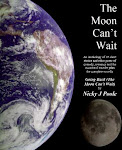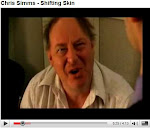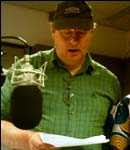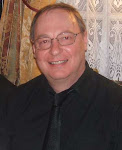Summary
Surrealist humour with musical medical twist
Surrealist humour with musical medical twist
For some weeks I had been experiencing feelings of discord. During quiet moments when I was resting, reading a newspaper or memorising recipes, I would detect unseemly rumblings from within my torso. I could feel my internal organs were out of tune, little overtures of muscular spasms, uncontrolled movements from within. At first I dismissed these as normal bodily functions, the background to everyday life. Yet I knew the harmony of my body had been disturbed. Eventually I could sustain it no longer and visited my physician.
As I gave a recital of my symptoms, he became a silent audience, listening to my theme of mounting disquiet. I finished my piece.
"What does it sound like to you, Doctor?" He refused to be drawn into an opinion. "I think you should go for some tests."
I felt several grace notes of alarm tinkle down my spine, and my solar plexus tightened like cat-gut. My temples hummed with dismay. I pressed. He gave an inscrutable look.
"These things are open to several interpretations. Let me arrange the tests for you."
"Tests! What sort of tests?" I exclaimed, staccato.
"We need to make some recordings. Then I will be able to tell you more."
So, within weeks, a booking was made for me to visit the local hospital. I was accompanied by a kindly nurse. I had to take various substances for some of the run-throughs to work properly. I had tubes inserted into places I prefer not to mention.
I returned to my Doctor’s.
"What do the tests reveal?" I asked.
"There’s no easy way to break this to you," he recited. "You need to compose yourself. It seems you may have an ensemble of musicians in your lower intestine."
"What?" I exclaimed. I felt sick to the pit of my stomach. "How is that possible?" A threnody of despair raged in my ears. I could not understand what he was saying.
"You should know that the body is like a place of many galleries. Sometimes it’s like the pits." He put on a studious face as he introduced me to the facets of his world that he was taught at medical school but which are unknown to the layman. "Normally, these work in tune with one another, to their own natural rhythm. But the body is a complicated thing. Sometimes you get the odd busker developing in there, sometimes a duo, occasionally a quartet."
"I have never heard of such a thing," I gasped, my panic reaching a crescendo. "Surely it is very rare."
"It has a more common time than you would think."
I cast my mind back to television programmes that I had seen between those with my beloved recipes. Now I came to think of it, I had heard of ailments like this. I had just not taken much notice. I had always been a healthy person. You never think something like this could happen to you. New questions began to transpose themselves from the recesses of my memory.
"Are they likely to be – instrumentalists?" I asked.
"Instrumentalists, singer/songwriters, sometimes a capella groups. Let’s hope it’s not a dance band."
"A dance band!" I gasped. "Could it be as bad as that?"
"Dance, jazz, who knows? Let’s just hope we caught it before the malady lingers on. Otherwise, there is a danger it could turn into a whole orchestra. You will need to go for more tests."
I returned to his surgery a few weeks later. His expression was grim and I knew it must be bad news.
"Go ahead, Doctor. Tell me."
"The tests reveal," he spoke with a slight rallentando, "unmistakable signs of a brass section. The disease is more advanced than we thought. Are you sure you didn’t have more obvious symptoms earlier? Auditions, perhaps?"
"What can I say, Doctor? I thought perhaps I was eating too much roughage. I’ve always had obbligatos in the morning. What do we do now?"
"There are four areas which we can try in concert. Drugs, radiation, surgical rearrangement, and alternative therapies such as relaxation and visualisation."
"But I was relaxed, taking a tacit rest, until I found out a symphony was being rehearsed in me. What is visualisation, anyway?"
"Visualisation is a technique you can do for yourself. Try to imagine what the orchestra looks like. Has it got a string section? Are the woodwinds organised? Is there a first violin or solo pianist? Most importantly, can you see the conductor?"
"Why is he so important?"
"Because if you can find the conductor, force him from his podium, and remove his baton, the orchestra cannot play, and your condition will be beaten, four to the bar. The recital will be over. You will go into remission and recover."
"Is there anything else?" I asked, impromptu.
"There is just one thing," said my Doctor – I could tell from the timbre of his voice that he did not hold this alternative any more highly than an improvisation. "You could try standing anywhere there is a lot of noise."
"Noise?" I echoed, "why?"
"Noise interferes with practice sessions, affects rehearsals and destroys the coherence of the orchestra’s repertoire."
"I’ll try it," I said.
It was to be a most unpleasant experience. At first, it was difficult to find anywhere cacophonous enough. I sought out road-works, building sites – anywhere there were pneumatic drills in use. I would come home with my ears ringing. I stood on the central reservation of motorways – they were not loud enough, and too middle of the road – I could feel the exposition of a piece developing within me. I had a lucky break with the onset of the holiday season – the local airport provided many charter flights, but even with take-offs every few minutes, there was too much silence in between. My ears told me all was not well. I returned to my Doctor.
"Things are getting worse," I told him. "I think I can recognise the style of a composer."
"Who do you think it is?" he asked. "It could be hard to Handel. And if it’s a variation of Elgar, that would be an Enigma."
"Beethoven," I said.
He sighed. "At least it’s not Strauss," he said with signs of relief. "A condition like this can sometimes be a Strauss-related illness. If it was Strauss it would be – well – goodnight Vienna."
"Thank God," I murmured. "It’s like that old-fashioned dance – one minuet you’re in, the next…"
"You’re out. Do you detect a time signature?"
"No, but I think the key is F major."
His brow furrowed. "Could be the Pastoral. Anything else?"
"The second movement may be molto vivace."
"Ah – you have been fooled by the relative minor." His experience clearly showed in these matters. "That would make it the Ninth Symphony."
"Oh no," I said, "not the Chorale! Not the Ode To Joy."
He put a reassuring hand on my shoulder. "Let’s hope it doesn’t come to that," he said with a gentle air. "That’s the finale."
Autumn approached, and with it, the opportunity to buy fireworks. I purchased as many bangers as I could, crackerjacks, rip-raps, screaming banshees. Eventually my neighbour complained when my hat blew off my head and landed on the roof of his conservatoire, traumatising his wife.
Finally, in desperation, I went clubbing. Night after night I would stand next to the speaker stacks, soaking up house music until I was overwhelmed with nausea – usually within two minutes. I persevered, until I was staggering home in the small hours, crazed with tinnitus.
I returned to my Doctor after another round of tests. I was on the brink of despair. The house music had been my last hope.
My Doctor looked overjoyed, the first time I had seen him smile in months. "The results of your latest tests have just come back. You are in the clear! I’ve never seen anything like it. No strings, no woodwind, no percussion. Even the timpani have gone."
I was astounded, "Are you sure?" I said. This seemed too much to hope for after all I had endured, and my mind resonated with doubt.
"Your orchestra has gone. You have no music in you."
Still I hesitated. "It’s just that… well, every time I walk I think I can hear a squeaking sound coming from my bottom." It was no time for false modesty.
"Show me," he said. I walked round his consulting room. "Hear that?" I said, "that faint high pitched sound?"
He looked dubious. "Let me ask my colleague for a second opinion. The tests were very conclusive."
We went into his colleague’s consulting room and my Doctor explained the situation. "This patient of mine believed he had an orchestra growing internally."
"What?" said the second doctor. "Is he mad?"
"And now he believes he can still hear tunes coming from his bottom when he walks."
"Walk around a little," said the second doctor. I did as I was instructed.
"What do you think?" said my Doctor to his colleague.
"I don’t know," he said, with a shake of his head. "It just sounds to me like some silly arse whistling."
THE END
.jpg)






2 comments:
There's too much sax and violins in fiction these days.
Good post.
Post a Comment